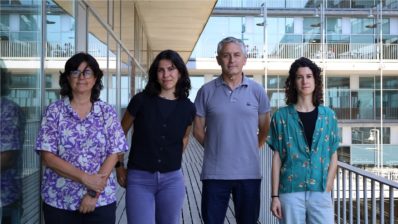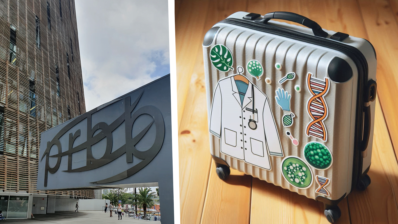Two research teams at the Hospital del Mar Medical Research Institute (IMIM) have made a couple of discoveries that could improve the treatment of different types of cancer. They have found processes that explain metastasis (in skin cancer) or lack of response to treatment (in colon and rectal cancer), and in both cases they have found markers that may help to reverse the situation.
Skin cancer
The first study, led by Inma Hernández-Muñoz from IMIM’s Inflammatory and Neoplastic Dermatological Diseases group, provides new data on how squamous cell carcinoma (a type of skin tumour) metastasises.
Based on the study of a hundred tumours, it has been found that when the levels of the dyskerin protein drop, a change is induced in the metabolism of the tumour cells, which go from consuming glucose to feeding on lipids, specifically LDL cholesterol molecules, known as bad cholesterol. This allows them to survive migration to the lymph nodes and, from there, to other organs where they proliferate.
The study also showed how treatment with statins, which are used to combat high LDL levels, caused lipid metabolism to remit and prevented the onset of the metastatic process.
This work was carried out in collaboration with the Proteomics Unit of the Centre for Genomic Regulation (CRG) and Pompeu Fabra University.
Colon and rectal cancer
The second study comes from the Laboratory for Translational Research in Tumour Microenvironment, led by Alexandre Calon, and has counted with the participation of several research institutes and universities in Catalonia and Spain, as well as the Cancer CIBER (CIBERONC).
Again using samples from patients with advanced colon and rectal cancer, but also previously in mouse models, they have observed that when the usual chemotherapy treatment is used in these cases, the platinum used (oxiplatin) accumulates in the healthy cells surrounding the tumour cells. This accumulation, which can last for more than two years, leads to the activation of certain genes that can decrease the cancer’s sensitivity to treatment.
“We have discovered a mechanism of resistance to oxaliplatin and a marker of this resistance in patients with colon and rectal cancer”
Jenniffer Linares, first author of the study (IMIM)
In turn, it has been discovered that periostin protein levels can be used as a marker to identify tumours that will not respond well to chemotherapy. Thus, the group will now be investigating whether combining chemotherapy with a peptide that prevents platinum from accumulating in fibroblasts can restore treatment capacity.
Andrades E, Toll A, Deza G, Segura S, Gimeno R, Espadas G, Sabidó E, Haro N, Pozo ÓJ, Bódalo M, Torres P, Pujol RM, Hernández-Muñoz I. Loss of dyskerin facilitates the acquisition of metastatic traits by altering the mevalonate pathway. Life Sci Alliance. 2023 Feb 2;6(4):e202201692. doi: 10.26508/lsa.202201692. PMID: 36732018; PMCID: PMC9899484
Linares, J., Sallent-Aragay, A., Badia-Ramentol, J. et al. Long-term platinum-based drug accumulation in cancer-associated fibroblasts promotes colorectal cancer progression and resistance to therapy. Nat Commun 14, 746 (2023). https://doi.org/10.1038/s41467-023-36334-1







